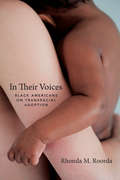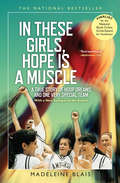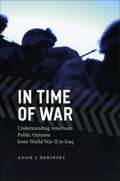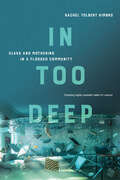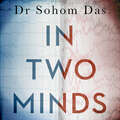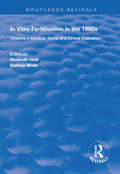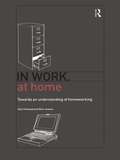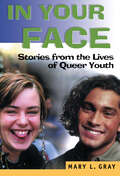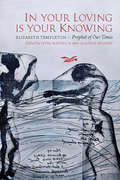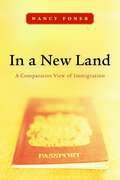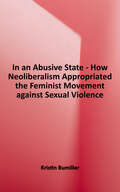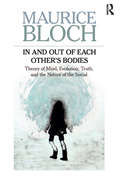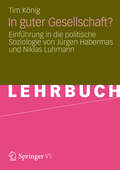- Table View
- List View
In The Name Of Identity: Violence And The Need To Belong
by Barbara Bray Amin MaaloufIn the Name of Identity is as close to summer reading as philosophy gets. It is a personal, sometimes even intimate, account of identity-in-the-world, not a treatise on the thorny metaphysics of identity. A novelist by trade, Amin Maalouf is a fluid writer, and he is aided by Barbara Bray's award-winning translation. His aim is to illuminate the roots of violence and hatred, which he sees in tribalistic forms of identity. He argues that our convictions and notions of identity--whether cultural, religious, national, or ethnic--are socially habituated and frequently dangerous. We'd give them up, he argues, if we thought more closely about them. Though the book has been heralded as radical and surprising, Maalouf essentially espouses an Enlightenment sensibility, a faith in the brotherhood of man. He is a believer in progress, arguing that "the wind of globalisation, while it could lead us to disaster, could also lead us to success. " In fact, he envisions a globalized world in which our local identities are subordinated to a broader "allegiance to the human community itself. " Maalouf wants us to retain our distinctiveness, but he wants it subsumed under the nave of common understanding. --Eric de Place
In The Neighborhood
by Peter LovenheimRead Peter Lovenheim's posts on the Penguin Blog. Based on a popular New York Times Op-Ed piece, this is the quirky, heartfelt account of one man's quest to meet his neighbors-and find a sense of community. Journalist and author Peter Lovenheim has lived on the same street in suburban Rochester, NY, most of his life. But it was only after a brutal murder-suicide rocked the community that he was struck by a fact of modern life in this comfortable enclave: no one knew anyone else. Thus begins Peter's search to meet and get to know his neighbors. An inquisitive person, he does more than just introduce himself. He asks, ever so politely, if he can sleep over. In this smart, engaging, and deeply felt book, Lovenheim takes readers inside the homes, minds, and hearts of his neighbors and asks a thought-provoking question: do neighborhoods matter-and is something lost when we live among strangers? .
In Their Own Voices: Transracial Adoptees Tell Their Stories
by Rita Simon Rhonda RoordaNearly forty years after researchers first sought to determine the effects, if any, on children adopted by families whose racial or ethnic background differed from their own, the debate over transracial adoption continues. In this collection of interviews conducted with black and biracial young adults who were adopted by white parents, the authors present the personal stories of two dozen individuals who hail from a wide range of religious, economic, political, and professional backgrounds. How does the experience affect their racial and social identities, their choice of friends and marital partners, and their lifestyles? In addition to interviews, the book includes overviews of both the history and current legal status of transracial adoption.
In Their Parents' Voices: Reflections on Raising Transracial Adoptees
by Rita Simon Rhonda RoordaRita J. Simon and Rhonda M. Roorda's In Their Own Voices: Transracial Adoptees Tell Their Stories shared the experiences of twenty-four black and biracial children who had been adopted into white families in the late 1960s and 70s. The book has since become a standard resource for families and practitioners, and now, in this sequel, we hear from the parents of these remarkable families and learn what it was like for them to raise children across racial and cultural lines.These candid interviews shed light on the issues these parents encountered, what part race played during thirty plus years of parenting, what they learned about themselves, and whether they would recommend transracial adoption to others. Combining trenchant historical and political data with absorbing firsthand accounts, Simon and Roorda once more bring an academic and human dimension to the literature on transracial adoption.
In Their Siblings’ Voices: White Non-Adopted Siblings Talk About Their Experiences Being Raised with Black and Biracial Brothers and Sisters
by Rita Simon Rhonda RoordaIn Their Siblings' Voices shares the stories of twenty white non-adopted siblings who grew up with black or biracial brothers and sisters in the late 1960s and 1970s. Belonging to the same families profiled in Rita J. Simon and Rhonda M. Roorda's In Their Own Voices: Transracial Adoptees Tell Their Stories and In Their Parents' Voices: Reflections on Raising Transracial Adoptees, these siblings offer their perspectives on the multiracial adoption experience, which, for them, played out against the backdrop of two tumultuous, politically charged decades. Simon and Roorda question whether professionals and adoption agencies adequately trained these children in the challenges presented by blended families, and they ask if, after more than thirty years, race still matters. Few books cover both the academic and the human dimensions of this issue. In Their Siblings' Voices helps readers fully grasp the dynamic of living in a multiracial household and its effect on friends, school, and community.
In Their Voices
by Rhonda M. RoordaWhile many proponents of transracial adoption claim that American society is increasingly becoming "color-blind," a growing body of research reveals that for transracial adoptees of all backgrounds, racial identity does matter. Rhonda M. Roorda elaborates significantly on that finding, specifically studying the effects of the adoption of black and biracial children by white parents. She incorporates diverse perspectives on transracial adoption by concerned black Americans of various ages, including those who lived through Jim Crow and the Civil Rights era. All her interviewees have been involved either personally or professionally in the lives of transracial adoptees, and they offer strategies for navigating systemic racial inequalities while affirming the importance of black communities in the lives of transracial adoptive families. In Their Voices is for parents, child-welfare providers, social workers, psychologists, educators, therapists, and adoptees from all backgrounds who seek clarity about this phenomenon. The author examines how social attitudes and federal policies concerning transracial adoption have changed over the last several decades. She also includes suggestions on how to revise transracial adoption policy to better reflect the needs of transracial adoptive families. Perhaps most important, In Their Voices is packed with advice for parents who are invested in nurturing a positive self-image in their adopted children of color and the crucial perspectives those parents should consider when raising their children. It offers adoptees of color encouragement in overcoming discrimination and explains why a "race-neutral" environment, maintained by so many white parents, is not ideal for adoptees or their families.
In Their Voices: Black Americans on Transracial Adoption
by Rhonda RoordaWhile many proponents of transracial adoption claim that American society is increasingly becoming "color-blind," a growing body of research reveals that for transracial adoptees of all backgrounds, racial identity does matter. Rhonda M. Roorda elaborates significantly on that finding, specifically studying the effects of the adoption of black and biracial children by white parents. She incorporates diverse perspectives on transracial adoption by concerned black Americans of various ages, including those who lived through Jim Crow and the Civil Rights era. All her interviewees have been involved either personally or professionally in the lives of transracial adoptees, and they offer strategies for navigating systemic racial inequalities while affirming the importance of black communities in the lives of transracial adoptive families.In Their Voices is for parents, child-welfare providers, social workers, psychologists, educators, therapists, and adoptees from all backgrounds who seek clarity about this phenomenon. The author examines how social attitudes and federal policies concerning transracial adoption have changed over the last several decades. She also includes suggestions on how to revise transracial adoption policy to better reflect the needs of transracial adoptive families. Perhaps most important, In Their Voices is packed with advice for parents who are invested in nurturing a positive self-image in their adopted children of color and the crucial perspectives those parents should consider when raising their children. It offers adoptees of color encouragement in overcoming discrimination and explains why a "race-neutral" environment, maintained by so many white parents, is not ideal for adoptees or their families.
In These Girls, Hope Is a Muscle: A True Story of Hoop Dreams and One Very Special Team
by Madeleine Blais&“Beautifully written . . . A celebration of girls and athletics.&” The national bestselling sports classic from a Pulitzer Prize–winning journalist (USA Today). Expanded and updated with a new epilogue, Madeleine Blais&’ book tells the story of a season in the life of the Amherst Lady Hurricanes, a girls&’ high school basketball team from the Western Massachusetts college town. The Hurricanes were a talented team with a near-perfect record, but for five straight years, when it came to the crunch of the playoffs, they somehow lacked the desire to go all the way. Now, led by senior guards Jen Pariseau, a three-point specialist, and Jamila Wideman, an All-American phenom, this was the year to prove themselves. It was a season to test their passion for the sport and their loyalty to each other, and a chance to discover who they really were. As an off-season of summer jobs and basketball camps turns to fall, as students arrive and the games begin, Blais charts the ups and downs of the team and paints a portrait of the wider Amherst community, which comes to revel in the athletic exploits of their girls. Finally, a women&’s team was getting the attention they deserve. And the Hurricanes were richly deserving; these teenage girls are fierce and funny, smart and ambitious, and they are the heart of this gripping book. &“Extraordinary.&” —The Baltimore Sun &“A picture of a changing period in American sports history, when a town rallied around its female athletes in a way that had previously been reserved for males.&” —Publishers Weekly
In This Place Called Prison: Women's Religious Life in the Shadow of Punishment
by Rachel EllisIn This Place Called Prison offers a vivid account of religious life within an institution designed to punish. Rachel Ellis conducted a year of ethnographic fieldwork inside a U.S. state women’s prison, talking with hundreds of incarcerated women, staff, and volunteers. Through their stories, Ellis shows how women draw on religion to navigate lived experiences of carceral control. A trenchant study of religion colliding and colluding with the state in an enduring tension between freedom and constraint, this book speaks to the quest for dignity and light against the backdrop of mass incarceration, state surveillance, and American inequality.
In Time of War: Understanding American Public Opinion from World War II to Iraq
by Adam J. BerinskyFrom World War II to the war in Iraq, periods of international conflict seem like unique moments in U. S. political history--but when it comes to public opinion, they are not. To make this groundbreaking revelation, In Time of War explodes conventional wisdom about American reactions to World War II, as well as the more recent conflicts in Korea, Vietnam, the Gulf, Afghanistan, and Iraq. Adam Berinsky argues that public response to these crises has been shaped less by their defining characteristics--such as what they cost in lives and resources--than by the same political interests and group affiliations that influence our ideas about domestic issues. With the help of World War II-era survey data that had gone virtually untouched for the past sixty years, Berinsky begins by disproving the myth of "the good war" that Americans all fell in line to support after the Japanese bombed Pearl Harbor. The attack, he reveals, did not significantly alter public opinion but merely punctuated interventionist sentiment that had already risen in response to the ways that political leaders at home had framed the fighting abroad. Weaving his findings into the first general theory of the factors that shape American wartime opinion, Berinsky also sheds new light on our reactions to other crises. He shows, for example, that our attitudes toward restricted civil liberties during Vietnam and after 9/11 stemmed from the same kinds of judgments we make during times of peace. With Iraq and Afghanistan now competing for attention with urgent issues within the United States,In Time of War offers a timely reminder of the full extent to which foreign and domestic politics profoundly influence--and ultimately illuminate--each other.
In Too Deep: Class and Mothering in a Flooded Community
by Rachel KimbroIn a small Texas neighborhood, an affluent group of mothers has been repeatedly rocked by catastrophic flooding—the 2015 Memorial Day flood, the 2016 Tax Day flood, and sixteen months later, Hurricane Harvey. Yet even after these disrupting events, almost all mothers in this neighborhood still believe there is only one place for them to live: Bayou Oaks.In Too Deep is a sociological exploration of what happens when climate change threatens the carefully curated family life of upper-middle-class mothers. Through in-depth interviews with thirty-six Bayou Oaks mothers whose homes flooded during Hurricane Harvey, Rachel Kimbro reveals why these mothers continued to stay in a place that was becoming more and more unstable. Rather than retreating, the mothers dug in and sustained the community they have chosen and nurtured, trying to keep social, emotional, and economic instability at bay. In Too Deep provides a glimpse into how class and place intersect in an unstable physical environment and underlines the price families pay for securing their futures.
In Two Minds: Stories of murder, justice and recovery from a forensic psychiatrist
by Dr Sohom Das'thought provoking'Gwen AdsheadShocking, eye-opening and grimly fascinating, these are the true stories, patients and cases that have characterised a career spent treating mentally disordered offenders.As a forensic psychiatrist, it's Dr Das's job to treat and rehabilitate what the tabloids might call the 'criminally insane', many of whom assault, rob, rape, and even kill. His work takes him to high-security prisons and securely locked hospital wards across the country, as well as inside courtrooms, giving evidence as an expert witness.From the young woman who smothered her two-year-old nephew in a flash of psychosis, to the teenager who set his house on fire with his mother locked inside, Dr Das must delve into the minds of these violent offenders to elicit their symptoms of mental illness, understand their actions and prevent future atrocities.In this honest, revealing and at times humorous memoir, Dr Das shares stories from his fifteen years as a psychiatric doctor working with this dangerous clientele, detailing some of his most extreme, heart-breaking and bizarre cases - and how he's learned to live with his mistakes when the worse happens.Compelling, enlightening and candid, if you enjoyed Unnatural Causes, Dark Side of the Mind or The Prison Doctor, you'll love IN TWO MINDS.
In Two Minds: Stories of murder, justice and recovery from a forensic psychiatrist
by Dr Sohom Das'thought provoking'Gwen AdsheadShocking, eye-opening and grimly fascinating, these are the true stories, patients and cases that have characterised a career spent treating mentally disordered offenders.As a forensic psychiatrist, it's Dr Das's job to treat and rehabilitate what the tabloids might call the 'criminally insane', many of whom assault, rob, rape, and even kill. His work takes him to high-security prisons and securely locked hospital wards across the country, as well as inside courtrooms, giving evidence as an expert witness.From the young woman who smothered her two-year-old nephew in a flash of psychosis, to the teenager who set his house on fire with his mother locked inside, Dr Das must delve into the minds of these violent offenders to elicit their symptoms of mental illness, understand their actions and prevent future atrocities.In this honest, revealing and at times humorous memoir, Dr Das shares stories from his fifteen years as a psychiatric doctor working with this dangerous clientele, detailing some of his most extreme, heart-breaking and bizarre cases - and how he's learned to live with his mistakes when the worse happens.Compelling, enlightening and candid, if you enjoyed Unnatural Causes, Dark Side of the Mind or The Prison Doctor, you'll love IN TWO MINDS.
In Two Minds: Stories of murder, justice and recovery from a forensic psychiatrist
by Dr Sohom DasShocking, eye-opening and grimly fascinating, these are the true stories, patients and cases that have characterised a career spent treating mentally disordered offenders.Listen to the end of the audiobook for an exclusive bonus chapter, written and read by the author.As a forensic psychiatrist, it's Dr Das's job to treat and rehabilitate what the tabloids might call the 'criminally insane', many of whom assault, rob, rape, and even kill. His work takes him to high-security prisons and securely locked hospital wards across the country, as well as inside courtrooms, giving evidence as an expert witness.From the young woman who smothered her two-year-old nephew in a flash of psychosis, to the teenager who set his house on fire with his mother locked inside, Dr Das must delve into the minds of these violent offenders to elicit their symptoms of mental illness, understand their actions and prevent future atrocities.In this honest, revealing and at times humorous memoir, Dr Das shares stories from his fifteen years as a psychiatric doctor working with this dangerous clientele, detailing some of his most extreme, heart-breaking and bizarre cases - and how he's learned to live with his mistakes when the worse happens.Compelling, enlightening and candid, if you enjoyed Unnatural Causes, Dark Side of the Mind or The Prison Doctor, you'll love IN TWO MINDS.
In Vitro Fertilisation in the 1990s: Towards a Medical, Social and Ethical Evaluation (Routledge Revivals)
by Elisabeth Hildt Dietmar MiethPublished in 1998, this book is a collected volume of papers from the first conference of the European Network for Biomedical ethics. The main subject of this conference is the ethical assessment of IVF in view of its concrete application as an infertility treatment and the consideration of possible alternatives for use. Twenty years after the introduction and the establishment of this therapy a more concrete evaluation of its medical indications, social conditions and consequences, the psychological consequences for the women involved and the parent-child relationship becomes possible. The legal and ethical evaluation of the reproduction technology as regards for example the legal and moral status of supernumery embyos in cryo-conservation has also to be considered in a European perspective. The ethical evaluation concentrates today on the new evolution that IVF technology takes in relation to the extension of diagnostics possibilities due to genetic research. Little work has been done on the connection between IVF and genetic diagnostics and therapy, so the medical and ethical evaluation of the connecting lines are also included in the book.
In Work, At Home: Towards an Understanding of Homeworking
by Nick Jewson Alan FelsteadMore and more people are choosing to earn a living at home. In Work, At Home explores the meaning and experience of this type of employment by covering a wide range of issues including:* social relationships* current research methodologies* statistical analyses of global labour markets* the emotional and psychological processes of self-management* home relations.Presenting statistical analyses of labour markets in North America, Europe, Asia and Australia, In Work, At Home provides a valuable introduction to the issues and debates surrounding homeworking and will appeal to students across a range of disciplines, including sociology, business studies and women's studies.
In Your Face: Stories from the Lives of Queer Youth
by John Dececco, Phd Mary L GrayFirst published in 1999. Routledge is an imprint of Taylor & Francis, an informa company.
In Your Loving is Your Knowing: Elizabeth Templeton—Prophet of Our Times
by Peter Matheson and Alastair Hulbert&“A wonderful book . . . [Templeton&’s] style and material are a very appealing combination of the cerebral and the down-to-earth, full of humor and a seasoning of personal anecdotes.&” —Coracle An anthology of 33 talks, articles, lectures and sermons by one of the most outstanding theologians of her generation. Elizabeth Templeton&’s accessible and passionate writing is both refreshing and thought-provoking, exploring ideas that concern us all—life, freedom, forgiveness, death, love, evil, culture and belonging, among many others. All the pieces dive with apparent effortlessness to the heart of the issues, combining brilliant original scholarship with a warm sensitivity to the difficulties of many people in decoding theology, relating it to their own life and thought.&“[Templeton] was known and appreciated for her freedom of speech and attentiveness to anyone and everything . . . Her interest in the Church&’s relationship with the world is what comes out in theses texts.&” —Conference of European Churches&“This collection of [Templeton&’s] unpublished addresses and writings testifies [that] she brought as much theological acuteness and passion to sermons in local churches as she did to the World Council of Churches Assembly, or the Lambeth Conference . . . Matheson and Hulbert have negotiated their [editorial assignment] sensitively and coherently . . . Readers will find many more valuable nuggets for themselves.&” —The Church Times
In a Heartbeat: Sharing the Power of Cheerful Giving
by Sally Jenkins Leigh Anne Tuohy Sean TuohyFor the first time, the remarkable couple depicted in The Blind Side tells their own deeply inspiring story--First came the bestselling book, then the Oscar-nominated movie--the story of Michael Oher and the family who adopted him has become one of the most talked-about true stories of our time. But until now, Leigh Anne and Sean Tuohy have never told this astonishing tale in their own way and with their own words. For Leigh Anne and Sean, it all begins with family. Leigh Anne, the daughter of a tough-as-nails U. S. Marshal, decided early on that her mission was to raise children who would become "cheerful givers. " Sean, who grew up poor, believed that one day he could provide a home that would be "a place of miracles. " Together, they raised two remarkable children--Collins and Sean Jr. -- who shared their deep Christian faith and their commitment to making a difference. And then one day Leigh Anne met a homeless African-American boy named Michael and decided that her family could be his. She and her husband taught Michael what this book teaches all of us: Everyone has a blind side, but a loving heart always sees a path toward true charity. Michael Oher's improbable transformation could never have happened if Leigh Anne and Sean Tuohy had not opened their hearts to him. In this compelling, funny, and profoundly inspiring book, the Tuohys take us on an extraordinary journey of faith and love--and teach us unforgettable lessons about the power of giving.
In a New Land: A Comparative View of Immigration
by Nancy Foner2007 Choice Outstanding Academic TitleA comparative analysis of the U.S.'s contemporary immigrants to those who arrived a century agoAccording to the 2000 census, more than 10% of U.S. residents were foreign born; together with their American-born children, this group constitutes one fifth of the nation's population. What does this mass immigration mean for America? Leading immigration studies scholar, Nancy Foner, answers this question in her study of comparative immigration. Drawing on the rich history of American immigrants and current statistical and ethnographic data, In a New Land compares today’s new immigrants with the past influxes of Europeans to the United States and across cities and regions within the United States. Foner looks at immigration across nation-states, and over different periods of time, offering a comprehensive assessment and analysis.This original approach to the study of recent U.S. immigration focuses on race and ethnicity, gender, and transnational connections. Centering her analysis on the groups that have come through and significantly shaped New York City, Foner compares today’s Latin American, Asian, and Caribbean newcomers with eastern and southern European immigrants a century ago and with immigrants in other major U.S. cities. Looking beyond the United States, Foner compares West Indian immigrants in New York with those in London. And, more generally, the book views the process of immigrants’ integration in New York against other recent immigrant destinations in Europe.Drawing on a wealth of historical and contemporary research, and written in a clear and lively style, In a New Land provides fresh insights into the dynamics of immigration today and the implications for where we are headed in the future.
In an Abusive State: How Neoliberalism Appropriated the Feminist Movement against Sexual Violence
by Kristin BumillerThis text puts forth a powerful argument: that the feminist campaign to stop sexual violence has entered into a problematic alliance with the neoliberal state. Kristin Bumiller chronicles the evolution of this alliance by examining the history of the anti-violence campaign, the production of cultural images about sexual violence, professional discourses on intimate violence, and the everyday lives of battered women. She also scrutinizes the rhetoric of high-profile rape trials and the expansion of feminist concerns about sexual violence into the international human-rights arena. In the process, Bumiller reveals how the feminist fight against sexual violence has been shaped over recent decades by dramatic shifts in welfare policies, incarceration rates, and the surveillance role of social-service bureaucracies. Drawing on archival research, individual case studies, testimonies of rape victims, and interviews with battered women, Bumiller raises fundamental concerns about the construction of sexual violence as a social problem. She describes how placing the issue of sexual violence on the public agenda has polarized gender- and race-based interests. She contends that as the social welfare state has intensified regulation and control, the availability of services for battered women and rape victims has become increasingly linked to their status as victims and their ability to recognize their problems in medical and psychological terms. Bumiller suggests that to counteract these tendencies, sexual violence should primarily be addressed in the context of communities and terms of its links to social disadvantage. In an Abusive State is an impassioned call for feminists to reflect on how the co-optation of their movement by the neoliberal state creates the potential to inadvertently harm impoverished women and support punitive and racially based crime control efforts.
In and Out of Each Other's Bodies: Theory of Mind, Evolution, Truth, and the Nature of the Social
by Maurice BlochWhat is human sociality? How are universals such as truth and doubt variously demonstrated and negotiated in different cultures? This book offers an accessible introduction to these and other fundamental human questions. Bloch shows that the social consists of two very different things. One is a matter of continual adjustments between individuals who read each others' minds and thus, as in sex and birth, "go in and out of each other's minds and bodies." The other is a time defying system of roles and groups. Interaction at this level is created by ritual and is unique to humans. What is referred to by the word "religion" is a part of this, but it is not separate. The study of "religion" as such is therefore theoretically misleading. A second major theme is the way truth is established in different cultures. Bloch's arguments go against recent approaches in anthropology which have sought to relativize ideas of the social and religion.
In and Out: Rights of Migrants in the European Space (UNIPA Springer Series)
by Vincenzo Todaro Francesco Lo Piccolo Annalisa Mangiaracina Giuseppe PaternostroThis book examines contemporary migratory movements, starting from the European zone, but with an extension to other territorial contexts as well, with research orientation that focuses on the account of the migratory experiences collected in the research activity of the different authors, according to a multidisciplinary dimension. Starting from these key topics, the authors articulated and further developed its reflections through its own experiences at the national and international level, taking root within the current scientific debate on migration. The interdisciplinary approach and the different and innovative ways of analysing in depth the thematic contents of the migration phenomenon have made it possible to identify some key research questions. The relative answers find space in the articulated and complex system of contributions that is developed within this book and in particular in the three thematic parts into which it is divided. The first one deals with the theme of migration confronted with issues related to the 'right to the city' and the 'right to housing'; the second one deals with issues related to human rights; finally, the third one focuses on the different narratives of migrants' life experiences and aspects related to the linguistic representation of the urban space.
In guter Gesellschaft?
by Tim KönigJürgen Habermas und Niklas Luhmann haben über mehrere Jahrzehnte hinweg sowohl die allgemeine sozialwissenschaftliche Theoriebildung als auch die Diskussionen zur politischen Theorie entscheidend geprägt. Das vorliegende Buch führt in die Theorien des Sozialen und der Politik beider Autoren ein und zeigt auf, inwiefern beide miteinander zusammenhängen. Diskurs- und Systemtheorie der Politik können damit in ihren jeweiligen Leistungen und Grenzen besser nachvollzogen werden.
In the Aftermath of Genocide: Armenians and Jews in Twentieth-Century France
by Maud S. MandelFrance is the only Western European nation home to substantial numbers of survivors of the World War I and World War II genocides. In the Aftermath of Genocide offers a unique comparison of the country's Armenian and Jewish survivor communities. By demonstrating how--in spite of significant differences between these two populations--striking similarities emerge in the ways each responded to genocide, Maud S. Mandel illuminates the impact of the nation-state on ethnic and religious minorities in twentieth-century Europe and provides a valuable theoretical framework for considering issues of transnational identity. Investigating each community's response to its violent past, Mandel reflects on how shifts in ethnic, religious, and national affiliations were influenced by that group's recent history. The book examines these issues in the context of France's long commitment to a politics of integration and homogenization--a politics geared toward the establishment of equal rights and legal status for all citizens, but not toward the accommodation of cultural diversity. In the Aftermath of Genocide reveals that Armenian and Jewish survivors rarely sought to shed the obvious symbols of their ethnic and religious identities. Mandel shows that following the 1915 genocide and the Holocaust, these communities, if anything, seemed increasingly willing to mobilize in their own self-defense and thereby call attention to their distinctiveness. Most Armenian and Jewish survivors were neither prepared to give up their minority status nor willing to migrate to their national homelands of Armenia and Israel. In the Aftermath of Genocide suggests that the consolidation of the nation-state system in twentieth-century Europe led survivors of genocide to fashion identities for themselves as ethnic minorities despite the dangers implicit in that status.





